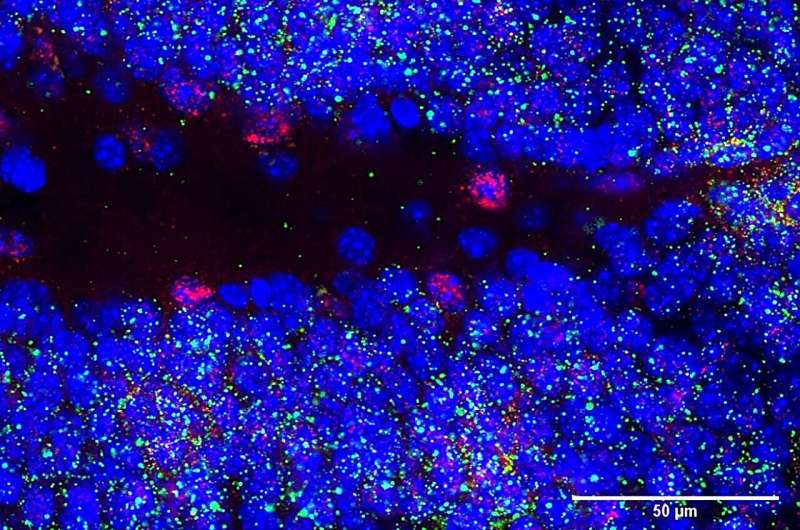This article has been reviewed according to Science X's editorial process and policies. Editors have highlighted the following attributes while ensuring the content's credibility:
fact-checked
peer-reviewed publication
trusted source
proofread
Learning and memory problems in Down syndrome linked to alterations in genome's 'dark matter'

Researchers at the Centre for Genomic Regulation (CRG) have found that the Snhg11 gene is critical for the function and formation of neurons in the hippocampus. Experiments with mice and human tissues revealed that the gene is less active in brains with Down syndrome, potentially contributing to the memory deficits observed in people living with the condition. The findings are published in the journal Molecular Psychiatry.
Traditionally, much of the focus in genomics has been on protein-coding genes, which in humans constitute around just 2% of the entire genome. The rest is "dark matter," including vast stretches of non-coding DNA sequences that do not produce proteins but are increasingly recognized for their roles in regulating gene activity, influencing genetic stability, and contributing to complex traits and diseases.
Snhg11 is one gene found in the dark matter. It is a long non-coding RNA, a special type of RNA molecule that is transcribed from DNA but does not encode for a protein. Non-coding RNAs are important regulators of normal biological processes, and their abnormal expression has been previously linked to the development of human diseases, such as cancer. The study is the first evidence that a non-coding RNA plays a critical role in the pathogenesis of Down syndrome.
Down syndrome is a genetic disorder caused by the presence of an extra copy of chromosome 21, also known as trisomy 21. It's the most common genetic cause of intellectual disability, estimated to affect five million people globally. People with Down syndrome have memory and learning problems, issues previously linked to abnormalities in the hippocampus, a part of the brain involved in learning and memory formation.
"The gene is particularly active in the dentate gyrus, a part of the hippocampus crucial for learning and memory and one of the few brain regions where new neurons are continuously created throughout life. We found that abnormally expressed Snhg11 results in reduced neurogenesis and altered plasticity, which plays a direct role in learning and memory, thus indicating a key role in the pathophysiology of intellectual disability," says Dr. César Sierra, first author of the paper.
The authors studied the hippocampus in mouse models that have a genetic makeup similar to Down syndrome in humans. The hippocampus has many different cell types, and the study aimed to understand how the presence of an extra chromosome 21 affects these cells.
The researchers isolated nuclei from the brain cells and used a technique called single nucleus RNA sequencing to see which genes are active in each cell. One of the most striking findings was in cells of the dentate gyrus, where the researchers detected an important reduction of the expression of Snhg11. The researchers also found lower levels of Snhg11 in the same types of tissues from human postmortem brains with trisomy 21, indicating the relevance for the human cases.
To understand the effects of the reduced Snhg11 expression on cognition and brain function, the researchers then experimentally reduced the activity of the gene in the brains of healthy mice. They found that low levels of Snhg11 were sufficient to reduce synaptic plasticity, which is the ability for neuronal connections to strengthen or weaken over time. Synaptic plasticity is crucial for learning and memory. It also reduced the mouse's ability to create new neurons.
To understand the real-world impact of their findings, the researchers also conducted various behavior tests with mice. These experiments confirmed that low levels of Snhg11 led to similar memory and learning problems as seen in Down syndrome, suggesting the gene regulates brain function.
Snhg11 has previously been linked to cell proliferation in different types of cancer. The researchers plan on carrying out further research to discover the exact mechanisms of action involved, information that could open potential avenues for new therapeutic interventions. They will also explore whether other genes involving long non-coding RNAs, many of which are yet to be discovered, might also contribute to intellectual disabilities.
"There are many interventions to help people with Down syndrome live independently, but only a few are pharmacological. Studies like this help lay the foundations to find strategies that can help improve memory, attention and language functions, or prevent cognitive decline associated with aging," says Dr. Mara Dierssen, co-author of the paper and Group Leader of the Cellular & Systems Neurobiology lab at the Centre for Genomic Regulation.
More information: The lncRNA Snhg11, a new candidate contributing to neurogenesis, plasticity and memory deficits in Down syndrome, Molecular Psychiatry (2024). DOI: 10.1038/s41380-024-02440-9





















